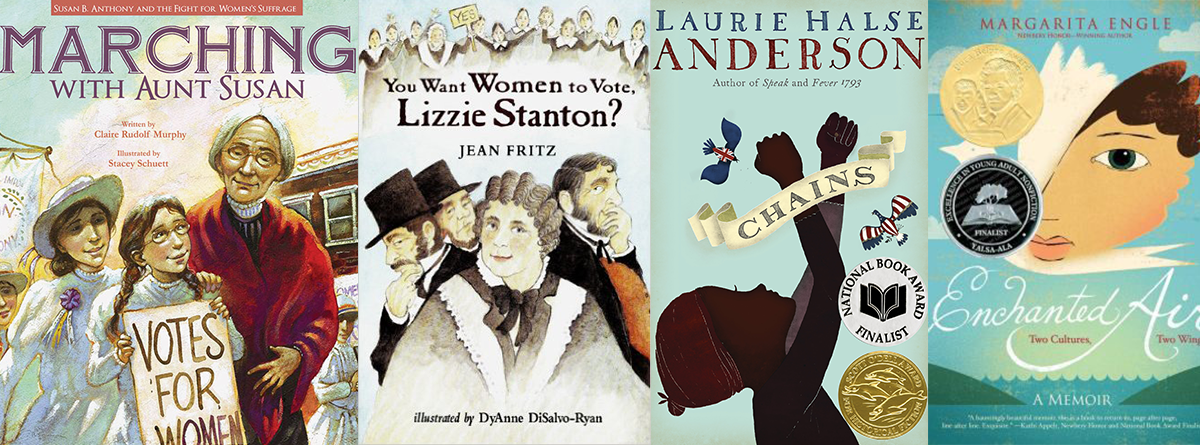
Celebrating Women’s History Month with Stories
March is Women’s History Month.
This celebration of half the population became a national observation in February 1980, when President Carter issued a Presidential Proclamation and declared the week of March 8 to be “National Women’s History Week.” Throughout the country, schools celebrated the important contributions women had made in history.
Seven years later, after over a dozen states had already extended the week-long celebration to a month, Congress declared March as “National Women’s History Month.”
Now, every year the President issues a Presidential Proclamation just like that of President Carter, to honor the extraordinary achievements of American women.
Schools and programs across the country will celebrate women’s history by remembering the incredible courage, perseverance, and achievements of women and girls throughout history.
We here at First Book are celebrating this month the way we celebrate just about everything – with stories!
Here are a few of our favorite books celebrating the extraordinary lives of women and girls:

Marching with Aunt Susan: Susan B. Anthony and the Fight for Women’s Suffrage by Claire Rudolph Murphy
All Bessie wants is to go hiking with her father and brothers. But it’s 1896 and girls don’t get to hike. They can’t vote either, which Bessie discovers when Susan B. Anthony comes to town to help lead the campaign for women’s suffrage. Inspired by the great woman, Bessie becomes involved in the movement and discovers that hiking is only one of the many things that women and girls aren’t allowed to do. But small efforts can result in small changes and maybe even big ones.
Recommended for readers ages 4-9

You Want Women to Vote, Lizzie Stanton? by Jean Fritz
Who says women shouldn’t speak in public? And why can’t they vote? These are questions Elizabeth Cady Stanton grew up asking herself. Her father believed that girls didn’t count as much as boys, and her own husband once got so embarrassed when she spoke at a convention that he left town. Luckily, Lizzie wasn’t one to let society stop her from fighting for equality for everyone. And though she didn’t live long enough to see women get to vote, our entire country benefited from her fight for women’s rights.
Recommended for readers ages 7-12

Lives of Extraordinary Women: Rulers, Rebels (and What the Neighbors Thought) by Kathleen Krull
Not all governments have been run by men. Lives of Extraordinary Women turns the spotlight on women who have wielded power, revealing their feats—and flaws—for all the world to see. Here you’ll find twenty of the most influential women in history: queens, warriors, prime ministers, first ladies, revolutionary leaders. Some are revered. Others are notorious. What were they really like?
In this grand addition to their highly praised series, Kathleen Krull and Kathryn Hewitt celebrate some of the world’s most noteworthy women, ranging from the famous to those whose stories have rarely been told.
Recommended for readers ages 7-12

Chains by Laurie Halse Anderson
If an entire nation could seek its freedom, why not a girl?
As the Revolutionary War begins, thirteen-year-old Isabel wages her own fight…for freedom. Promised freedom upon the death of their owner, she and her sister, Ruth, in a cruel twist of fate become the property of a malicious New York City couple, the Locktons, who have no sympathy for the American Revolution and even less for Ruth and Isabel. When Isabel meets Curzon, a slave with ties to the Patriots, he encourages her to spy on her owners, who know details of British plans for invasion. She is reluctant at first, but when the unthinkable happens to Ruth, Isabel realizes her loyalty is available to the bidder who can provide her with freedom.
From acclaimed author Laurie Halse Anderson comes this compelling, impeccably researched novel that shows the lengths we can go to cast off our chains, both physical and spiritual.
Recommended for readers ages 10-15

The Lightning Dreamer: Cuba’s Greatest Abolitionist by Margarita Engle
Opposing slavery in Cuba in the nineteenth century was dangerous. The most daring abolitionists were poets who veiled their work in metaphor. Of these, the boldest was Gertrudis Gómez de Avellaneda, nicknamed Tula. In passionate, accessible verses of her own, Engle evokes the voice of this book-loving feminist and abolitionist who bravely resisted an arranged marriage at the age of fourteen, and was ultimately courageous enough to fight against injustice. Historical notes, excerpts, and source notes round out this exceptional tribute.
Recommended for readers ages 10-15
How will you celebrate the stories of our mothers, sisters and friends this month? Motivate your class or program to follow in the footsteps of trailblazing women from all over the world with books. Find the titles above & more in the Women’s History Section on the First Book Marketplace.

